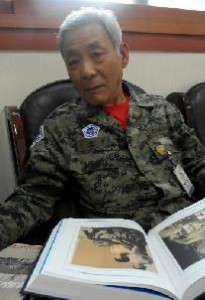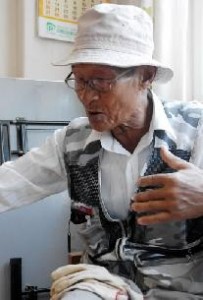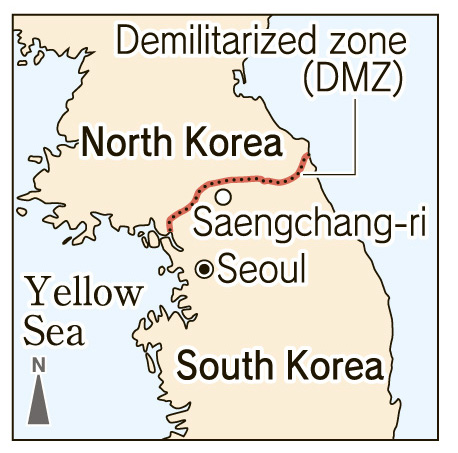Vietnam: 50 years after the use of defoliants, Part 2: Both victimizer and victim, Article 3
Jul. 24, 2012
Article 3: Price of alliance: South Korea
Priority on economy: Victims overshadowed
by Takamasa Kyoren, Staff Writer
Along North Korean border: Civilians also sprayed defoliants
In late May, Lee Seung Yeol, 66, greeted me at the small office of the Korean Disabled Veterans Association for Agent Orange, which is located on a hill in Seoul. Mr. Lee was dressed in his military uniform. “Korean soldiers didn’t know a thing about defoliants,” he said.
Mr. Lee served in central Vietnam for a year and a half from the fall of 1967, a period when the spraying of defoliants by the U.S. military was particularly intense. One day he was ordered to spray chemicals and cut down trees in a mountain forest near a U.S. military base. He and the other members of his unit stripped to their underwear to carry out the work.
After returning home, he began to suffer from numbness in both legs. He now walks with great difficulty. Under the South Korean government’s law providing compensation to the victims of defoliants, his disability was certified as mild. He receives approximately 347,000 won (about 300 dollars) per month. “I just did what I was ordered to do on the battlefield,” he said matter-of-factly as he rubbed his painful knees.
After the 1953 ceasefire in its war with North Korea, South Korea’s top priority was rebuilding its economy. At the request of the United States, with whom it formed an alliance, South Korea dispatched about 310,000 troops to Vietnam between 1964 and 1973. This number was second only to that of the U.S. among the countries that participated in the war. About 4,600 South Koreans died in Vietnam, and many of the veterans suffer from what are believed to be aftereffects from exposure to defoliants.
But under South Korea’s military regime, protest was prohibited. There was virtually no disclosure of information or reporting on defoliants. The victims’ plight was overshadowed by the booming economy. “The war cast a dark shadow over South Korean society, and it’s traumatic even now,” said Cho Jin Seok, 39, secretary-general of Nawauri, a Seoul-based peace organization.
But people started to speak out in 1992 when the democratization process began in South Korea. As the result of news coverage of the issue, the extent of the effects of defoliants on South Korean veterans also gradually began to become clearer. In response to the growing demand for compensation, in 1993 the government implemented a relief act that provided for the payment of medical care expenses and pensions. Meanwhile it was revealed that South Korean troops had massacred Vietnamese civilians. “South Korea suffered as the result of being invaded in the past. Then it brought harm to the people of another country,” said Mr. Cho.
During the Vietnam War, defoliants were also used in the vicinity of the demilitarized zone (DMZ) separating North and South Korea. In 1999 the U.S. government acknowledged that defoliants had been sprayed there.
According to the U.S. Department of Defense, U.S. military personnel stationed in South Korea sprayed about 80,000 liters of defoliants in a belt about 2 km wide along the South Korean side of the DMZ in order to protect against incursions by North Korean troops. The South Korean military was responsible for carrying out the work, and in some cases it was reportedly contracted out to local residents.
I traveled to the village of Saengchang-ri, a two-hour drive north of Seoul near the DMZ. At lunchtime few people were out and about in the village, which has a population of about 120. At a local meeting place, Kwon Jonin, 75, talked about his experiences with defoliants.
In 1971 he heard that the South Korean military was seeking people to spray agricultural chemicals. “I just volunteered because I wanted to help my country,” he said. Mr. Kwon sprayed the liquid chemicals on the forests in the mountains. He was 34 years old at the time. After finishing the job, he was overwhelmed by a sense of fatigue. “I should have been in the prime of life, but whenever I did even a little work I felt weary afterwards,” he said. He still takes three different medicines.
U.S. military personnel who were stationed in South Korea at the time are eligible for compensation for victims of defoliants. South Korea pays compensation to its Vietnam War veterans and to military personnel who were stationed along the DMZ. But there are no provisions for compensation for civilians. “I would like the government to give me a hand so I can at least live out the rest of my days in peace,” said Mr. Kwon.
Korean Compensation for Victims of Defoliants
A law authorizing aid to Korean victims of defoliants took effect in 1993. A pension and medical care costs are paid to victims on a monthly basis as “meritorious citizens.” The amount of compensation varies depending on the severity of the victim’s symptoms. In April of this year the law was revised to cover 37 diseases including prostate, lung and pharynx cancer as well as hypothyroidism. Second-generation victims are eligible to receive aid only if they suffer from spinal disorders.
(Originally published on July 5, 2012)










